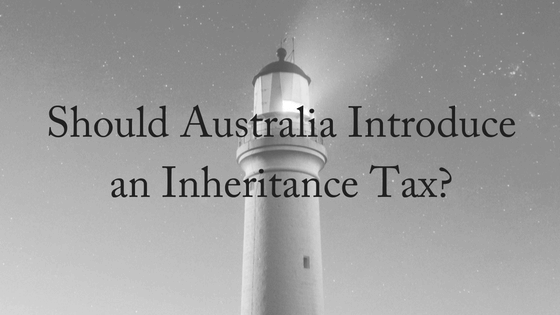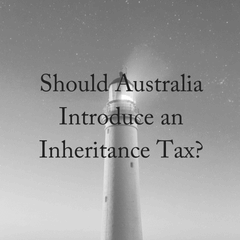
Should Australia reintroduce an inheritance tax? Some economists and business people think that reintroducing an inheritance tax could be the answer to the federal deficit black hole. In addition, the aging population and decreasing workforce means that traditional methods of revenue raising are shrinking.
Inheritance tax used to exist in Australia until late-1970s and early-1980s. But in 1978, Queensland Premier Joh Bjelke-Petersen abolished the state’s inheritance tax, which was followed by the governments of other states. Prime Minister Malcolm Fraser then followed suit and eliminated the federal inheritance tax.
National inheritance taxes exist in many other developed countries, such as the UK, USA, Germany, Belgium, the Republic of Ireland, France, and Japan. These OECD countries raise on average 0.41% of total taxation revenue from inheritance taxes. Even if this low rate was replicated in Australia, it could raise around $1.6 billion of additional Budget revenue each year.
[Tweet “An inheritance tax could raise $1.6 billion in Budget revenue each year.”]
The Henry Tax Review also gave in-principle support for an inheritance tax (called a “bequest tax” in the report), noting that it would be economically efficient and equitable. Still, it shied away from outright recommending re-introducing a bequest tax because of its controversial history:
A bequest tax would be a relatively efficient means of taxing savings. Decisions to save taken solely to fund consumption later in life would be unaffected. But decisions to save motivated by the desire to leave a bequest would be affected and this would impose some efficiency costs. In aggregate, though, bequest taxes are not likely to introduce large biases into donor behaviour. A bequest tax could increase labour supply and savings by recipients and prospective recipients, though the effects would be limited.
Such a tax could also be a progressive element of the tax and transfer system. Because the distribution of wealth in Australia is so uneven, most of the revenue available from a bequest tax could be raised from the top 10 per cent of households by wealth.
A tax on bequests would fit well with Australia’s demographic circumstances over the coming decades. Over the next 20 years, the proportion of all household wealth held by older Australians is projected to increase substantially. Large asset accumulations will be passed on to a relatively small number of recipients. On the other hand, a bequest tax would be complex. There would be a need for anti-avoidance provisions, including a tax on gifts. There would, inevitably, be significant administration and compliance costs.
A tax on bequests should not be levied at very high rates. People should not be unduly deterred from saving to leave bequests. A substantial tax-free threshold combined with a low flat rate beyond that point would be an appropriate structure for a bequest tax. Bequests to spouses should be concessionally treated.
Another design issue is whether to tax the whole of the donor’s estate or the inheritances received by individual recipients. There are arguments on either side, but on balance, they probably favour taxing each estate as a whole. A large number of other design issues would need to be considered. The more concessions and exemptions in the bequest tax, the greater its complexity and the greater the risk to efficiency and equity goals.
The Review has not sought to recommend the introduction of a bequest tax at this time, but believes that there should be full community discussion and consultation on the options.
 While an inheritance tax may be incredibly efficient on economic grounds, in Australia, it’s a deeply unpopular idea.
While an inheritance tax may be incredibly efficient on economic grounds, in Australia, it’s a deeply unpopular idea.
This is surely one of the biggest frustrations for economists — for some reason, the ‘best’ taxes also seem to be some of the most unpopular ones. Because of this, experience shows that many people manage their affairs to minimise the inheritance tax they have to pay.
Renowned economist and author of a best-selling analysis of wealth and income inequality, Professor Thomas Piketty, thinks estate taxes have a significant role to play.
“If you have labour income of $50,000 or $100,000 you are going to pay a lot of tax, but if you receive $1 million or $2 million in property from your family the tax rate will be zero per cent — there is no inheritance tax — which is very small as a tax rate.”
Venture capitalist Mark Carnegie perhaps sums it up best in his in-principle support of inheritance taxation, despite the fact his estate would be affected.
“I don’t believe that the only tax-free occupation available in Australia should be sitting in a Toorak coffee bar waiting for your dad or mum to die.”
According to the Barefoot Investor, it’s quite common for adult children to “put their lives on hold” waiting for the inheritance they believe they are entitled to. Would an inheritance tax stop this feeling of entitlement? Would it therefore eliminate some of the inheritance impatience and elder abuse that happens as family members and carers wait for an older person to die?
[Tweet “Should Australia reintroduce an inheritance tax?”]
It can be a difficult thing to decide how (and if) you want to leave a legacy to your children, but there are some simple ways for you to go about it.
- Plan your estate with a specialist in wills and estates so that your children don’t receive the bulk of the inheritance immediately, but rather once they have reached a certain age, or when they have established themselves first.
- Discuss strategies with a specialist in wills and estates so that you can avoid your children becoming spoilt when they receive your legacy. That includes actions such as utilising a trust or could involve providing funds for specific needs, such as buying a first home or setting up a business.
- Spend your assets so that you have nothing to pass on to your children!
There are a number of options available to you to cater for almost any what-if situation. The key is to seek advice from a specialist in wills and estates to knows this area of complex law well. For your free, 10-minute phone consultation, please contact us now.

